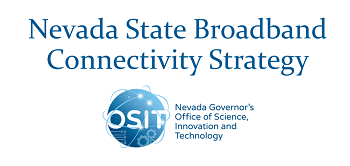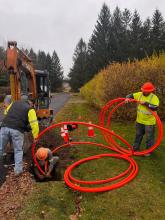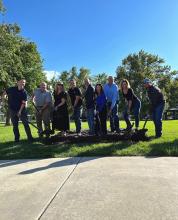
City Cast Las Vegas recently aired back-to-back podcast episodes about Internet access in the region, "Why Does Our Internet Suck?" followed by "Who Can Fix Our Internet?" As an organization that both produces stories like that as well as stars on them, as our own Sean Gonsalves did in the first episode, we wanted to share why we think these are well done and should serve as good lessons for others covering these issues.
The interviewer, Dayvid Figler, is on point with questions and the show offers a concise description of the challenge and potential solutions. It turns out that Dayvid also worked as a trial lawyer though, so perhaps not many reporters will be able to simply summon that level of command to shape the conversation. Nonetheless, these two shows are wonderfully informative.
The first episode sets up the second, which is where I want to spend more time. Dayvid's questions help Sean explain what broadband is and why some neighborhoods are left behind - one of the more common questions we see on this subject. They discussed who owns existing networks and what fiber is and why we should care.
Dayvid lays the groundwork for the second show by asking why competition hasn't solved the problem of why people are frustrated with their Internet service and Sean explains that while there is no one-size-fits-all solution, the Institute for Local Self-Reliance believes communities need to take action to improve their service.
The second episode features Brian Mitchell, Director of the Nevada State Office of Science and Innovation. No relation to me, Christopher Mitchell, or my boss, Stacy Mitchell (none of us are related - there are just a lot of Mitchells, ok?).
Brian does a very good job and seems very focused on improving Internet access for state residents. My critique of some of his answers is not to denigrate him but to raise up common problems with how we approach improving Internet access. Brian seems to be doing a good job and Dayvid's sharp questions are frankly difficult for someone in Brian's position who is obligated to follow state policy more than he can set it.
They start by noting a frankly wonderful recent announcement that Nevada is using $55.2 million in Capital Project Funds from the US Treasury for low-income apartment buildings.
As reported by the Nevada Current:
Affordability, not just cables and infrastructure, is a major factor determining whether internet service is accessible to families in Nevada, county officials have noted. In Nevada, areas with an average income of $32,000 or less have the fewest households with internet subscriptions.
A quick aside on this program - the Capital Projects Fund is one of several pots of funding states are tapping into for high-quality Internet access subsidies. It also happens to be one of the few that are designed to help with households in poverty rather than only focusing on households in rural areas. Most states are ignoring that crucial fact and spending it in rural areas because it is politically expedient, but Nevada is actually using it for low-income areas that will otherwise be left behind. (I'm not defending the design of the Low-Income MDU Connectivity Program, so much as the importance of state and local government focusing on these apartment buildings.)
Alright, back to Brian, who I think agrees with me about the FCC mapping debacle, but he’s much nicer about it. Dayvid asks a question I almost never hear - whether the claims by big cable and telephone companies are audited for accuracy. Boom! I'll bet he was great in the courtroom. (They aren't audited, unlike things like gas pumps.)
This is where Brian falls into a common pattern that we see - explaining that speedtests don't always tell the whole story. Speedtests done over poor Wi-Fi reception may suggest a slower connection than the ISP is actually delivering to the home. However, there is ample reason to think the larger concern should be the utter lack of accountability for all the false claims that we know big ISPs make.

Brian goes on to say that he read more ISPs are coming to Las Vegas and there is hope for competition real soon now. Such claims have been made for decades but most people still have very few high-quality Internet access options. It has always been just around the corner - whether from citywide Wi-Fi, WiMAX, 4G, 5G, broadband over power lines, satellite or any number of other technologies that failed to live up to the hype.
Dayvid pounces - what about municipal networks? Aha, Brian notes that they were outlawed in large cities in Nevada. Dayvid is ready to note that it seemed like that was a corrupt process driven by the cable and telephone monopolies to limit competition. Brian is in a tough position because regardless of what he thinks, the Legislature sets this policy and he has to abide by it.
Dayvid asks whether there might be any benefits to municipal broadband - a question that Brian can actually answer. He says it is not a panacea. (We agree!) And then he notes that some who tried it found it didn't work. Again, we see a defensive move to the talking points from the big cable and telephone companies. Very few people in a position of power want to upset them - they give too much money to all the candidates and have jobs in every district and it is just easier to avoid angering them.
Once again Dayvid comes back with what I assume are courtroom instincts with a follow-up I didn't see coming - whether he had looked into those where it did work. Yeah, it is obvious in retrospect but as someone who has done more than 600 recorded interviews and listened to thousands more, most people would have litigated just whether most failed or how they failed but Dayvid goes back to the important point - what can we learn from the majority of them?

Brian notes that he is not an expert on these matters but that he thought those that succeeded were in higher-income communities (nope, but a common belief) or more sophisticated (debatable). He correctly notes that it ain't easy. Dayvid ends with an important distinction though that I won't spoil.
These two podcast episodes give me hope for media coverage of this issue. We need more reporters to take this seriously and ask hard questions rather than hoping that the promises that tomorrow will finally bring that robust private sector competition for real this time.
My main complaint though? No one brought up the jewel of Churchill County - likely the nation's oldest municipal network that just happened to be east of Reno. Most of the county has gigabit access from a county-owned provider that has approximately 130 years of experience in telecom.
And my second complaint? They should have worked in the irony about how Senator Cortez Masto has been one of the major forces blocking Gigi Sohn from being confirmed to the FCC, hobbling the agency in ways that seem to be very bad for Nevada's broadband future.
But honestly, Nevada seems pretty well served by Dayvid and Brian, even if they aren’t by Cox and CenturyLink.







